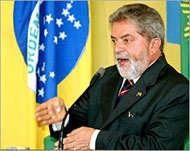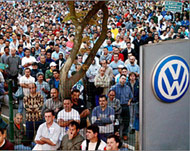Brazil walks a thin trade line
Representatives from 192 countries will descend on the megapolis of Sao Paulo on Sunday for the UN Conference on Trade and Development which runs till June 18.

The buzz is all about “new trade geography”, a phrase coined by the host country’s president, Luiz Inacio Lula da Silva, referring to the steady increase in trade between developing countries themselves.
Yet Brazil continues to curry favour with global multinationals.
Indeed, one of the poorest states in Brazil is the home of some of the richest corporations in the world, who can assemble, produce and export goods with huge tax breaks in the Zona Franca de Manaus, or Manaus Free Trade Zone.
Brand names
Thinking of the Amazon, one would probably think of deep green jungle and deep blue rivers.
Certainly, people would not visualise a vast bleak industrial park with such familiar creatures as Sharp, Gillette, Panasonic and Phillips; the common or garden variety Toshiba and Seiko; or the ubiquitous Nokia for that matter.
 |
|
President Lula has come a long |
Distrito Industrial in downtown Manaus, in the state of Amazonia, is part of the biggest “free trade” zone in South America.
Brazilian trade representatives were drumming up business in China last month, outlining the reasons that have been attracting trademarks known worldwide, such as Coca-Cola, to Distrito Industrial and other industrial parks.
The reasons included crucial location incentives besides tax holidays. Plots for industrial use in “free zone” have a symbolic price of just 30 US cents per square metre.
Investor-friendly
Promoted as a method of stimulating growth in hard-hit areas, Manaus Free Trade Zone brings in much wanted foreign earnings. More than 400 companies employ around 90,000 people.
Almost the entire output is meant for the domestic market. In Sao Paulo, for example, most of the electronic and white goods on sale are marked “Made in Amazonia“.
The “free zone” provides duty-free access to equipment and materials, and a bureaucracy-free, no-hassles environment for investors.
There is another major attraction: cheap labour. Brazil’s minimum wage is set to rise by a derisory amount from 240 to 260 reals ($83) a month.
Meagre earnings
Not everyone is quite happy, though. Luicano worked all week making fuses on a production line for Electrolux microwaves.
Having his lunch in one of the many eateries that dot the dusty highway, he is looking for more work.
 |
|
Foreign firms located in Manaus |
Last week his wages were nil.
This is because Electrolux classifies manual labour as “training” and does not pay those it does not hire.
“Only three or four out of every 10 people who train are offered work,” said Luciano.
To make matters worse, automation and downsizing have already cut the zone’s workforce dramatically.
Subsidised
The Manaus Free Trade Zone was initiated by the military junta in 1967, the same year it took power in Brazil.
It is designed to be a legally sound and safe entity that guarantees foreign companies full protection against any government attempt to dismantle it.
“When approaching a foreign investor, an official investment promoter could say: ‘I am offering you a legal regime and a logistic environment that will be valid for at least 20 years, during which you will not be surprised by any change in the rules of the game’,” said Helson Braga, economics professor at the Federal University of Rio de Janeiro.
The “free trade” zone’s legal status is valid until at least 2013. Foreign companies are exempted from income and export tax. Moreover, the government effectively subsidises their operations to the tune of $2.4 billion a year.
A revolt against these handouts was defeated by the Worker’s Party government in a key tax reform bill passed last August.
Sustainable use
Local entrepreneurs, however, are getting their act together. In only its fourth year, the Amazontech conference last September attracted 150,000 to buzz around the shiny Studio 5 conference centre in a business fair designed to help small and local businesses in the sustainable use of science and technology.
|
“When the ‘zone’ started out, foreign companies would invest locally as well has providing jobs. But now they don’t
Anderson, a health service employee in Amazonia state |
Business deals amounting to more than $30 million were completed over just three days. Still, the figure is dwarfed by the $1 billion that foreign companies make in annual exports alone from the “free trade zone”.
“A longstanding concern in the free-trade community has been to see that World Trade Organisation (WTO) rules do not reduce the freedom and efficiency of free-trade zones,” said professor Braga of Rio de Janeiro’s Federal University.
“The World Economic Processing Zones Association has maintained permanent contact with the WTO Secretariat to monitor and anticipate any decision that could hinder those goals.”
Cautionary tale
The city of Manaus was built on local labour in the rubber boom of the early 19th century. Back then, workers were enslaved and others killed by Amazonia’s European-owned businesses until demand ran out.
Today, the outlandish giant pink Amazon Opera House, fashioned from 36,000 tiles imported from France with chandeliers of Italian crystal, remains an incongruous relic of a fantastically rich past.
|
|
|
The opera house is a relic of the |
Could history repeat itself?
Critics say Amazonia is much more suited to eco-tourism and other uses of its natural materials, than to a factory-driven environment.
“Manaus is finished,” said Anderson, who works for the state’s health-care system. “When the ‘zone’ started out, foreign companies would invest locally in addition to providing jobs. But now they don’t put anything back.
Anderson added: “When there is somewhere cheaper for them and they leave, there will be nothing.“
|
|
|
|
